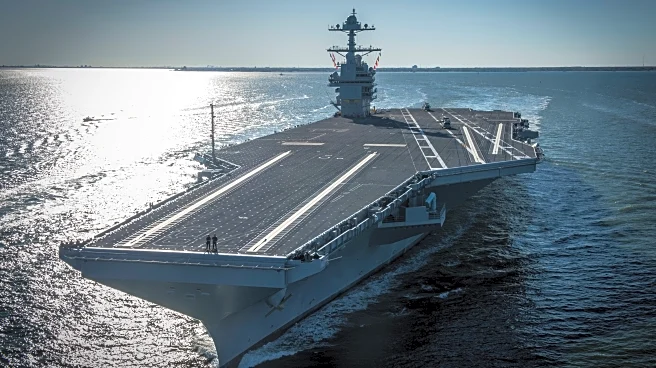What is the story about?
What's Happening?
The U.S. Department of the Treasury's Office of Foreign Assets Control (OFAC) has designated 21 entities and 17 individuals involved in networks that facilitate the acquisition of sensitive goods and technology for Iran's Ministry of Defense and Armed Forces Logistics (MODAFL). These networks support Iran's missile and military aircraft production efforts, posing significant threats to U.S. service members in the Middle East, commercial ships, and civilians. The action follows the reimposition of United Nations sanctions on Iran due to its non-compliance with nuclear commitments under the Joint Comprehensive Plan of Action. The designated networks span multiple continents, including Iran, Hong Kong, China, Germany, Türkiye, Portugal, and Uruguay, and are involved in procuring technology for advanced missile systems and military aircraft.
Why It's Important?
The sanctions underscore the U.S. government's commitment to curtailing Iran's ballistic missile program and preventing the proliferation of weapons of mass destruction. By targeting these networks, the U.S. aims to disrupt Iran's military capabilities and prevent the regime from acquiring technology that could be used for malign purposes. The action is part of a broader strategy to safeguard global security and uphold the international nonproliferation regime. It also highlights the collaborative efforts of U.S. agencies, including the Department of State, Department of Homeland Security, and the FBI, in dismantling illicit supply chains that threaten international stability.
What's Next?
The designated entities and individuals will face asset freezes and travel bans, and U.S. persons are prohibited from engaging in transactions with them. Financial institutions worldwide may risk secondary sanctions if they conduct significant transactions with the designated parties. The ultimate goal of these sanctions is to bring about positive changes in behavior, and OFAC provides guidance for entities seeking removal from the sanctions list. The international community is expected to continue monitoring Iran's activities and enforce restrictions to prevent further escalation of threats.
Beyond the Headlines
The sanctions reflect broader geopolitical tensions and the challenges of enforcing international agreements on nuclear nonproliferation. They also highlight the complexities of global supply chains and the role of technology in modern warfare. The action may influence diplomatic relations and negotiations with Iran, as well as impact the country's economic and military strategies. The involvement of multiple countries in the procurement networks illustrates the global nature of security threats and the need for coordinated international responses.















